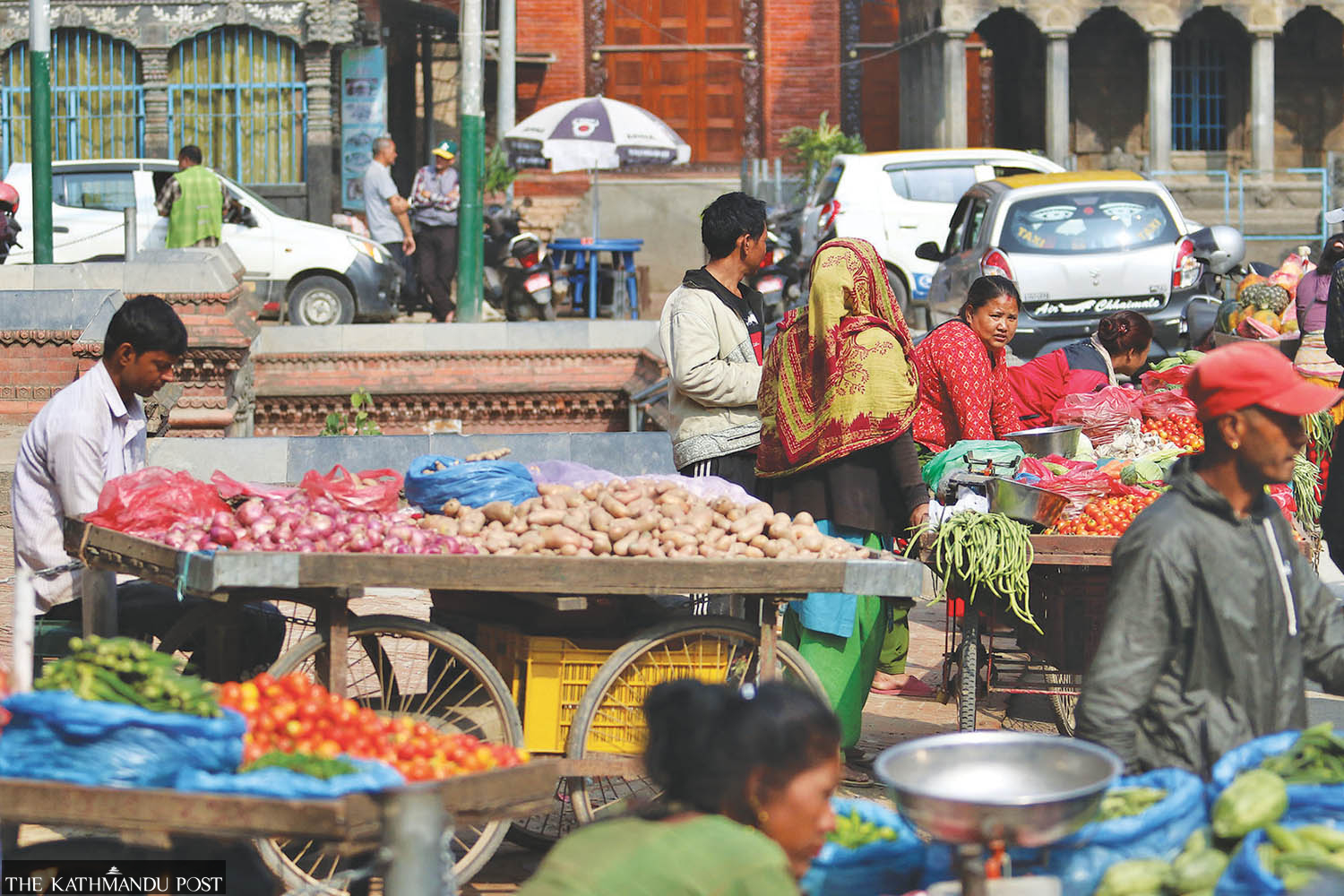
Sita Karki, 55, started selling fruits on the sidewalk near Ratna Park two years ago. One day, municipal officials rushed in and took away all her merchandise as per Kathmandu Metropolitan City's policy to remove pavement vendors.
Karki struggled to put together money to restart her business when Covid-19 came and everything was shut down. The government imposed a stay-at-home order to prevent the spread of the coronavirus, and the streets were closed.
“I recently restarted my business,” said Karki, who was selling goods in front of Bir Hospital on Monday afternoon. She keeps her eyes peeled for municipal officials who may swoop down on the street any moment and chase her away. “I am constantly worried,” she says.
Karki and her family of four live in a rented apartment in Asan. She earns Rs150 to Rs200 a day. Her husband used to sell clothes on the street too, but he stopped after his health failed two years ago.
“My youngest son is also a street vendor,” said Karki. The eldest one is differently-abled.
For somebody like Karki who has to live from day to day, the city doesn't provide a favourable working environment. Neither does she get any help from the government, social organisations or banks.
In Nepal, tens of thousands of workers in the informal economy face challenges and difficulties because the government does not regulate it. There is no safety net for many in the informal sector, especially in urban areas.
Nearly half of the business establishments operating in Nepal are not registered and are counted as informal enterprises, according to the Analytical Report on the Informal Sector published by the Central Bureau of Statistics last year.
Among the 923,027 business establishments in the country, 34,101 (3.7 percent) were street businesses. Of the 3.23 million people employed in the country, 45,330 people were engaged in such businesses.
Street vending is a means of livelihood for tens of thousands of people across the country. Vendors not only lead a hard life, they face repeated crackdowns and restrictions from hostile city officials for encroaching the footpath and obstructing pedestrians.
“Every pavement hawker knows it is illegal to run a business on the footpaths and streets,” said Basanta Acharya, information officer at Kathmandu Metropolitan City. “We cannot register them. They cannot operate even if we impose taxes on them.”
According to Acharya, when street encroachment becomes severe affecting movement of pedestrians, municipal officials are mobilised to remove them.
The confrontation between street vendors and municipal officials has been going on for years.
“There is no proper plan or policy to manage street vendors in Kathmandu,” said Acharya. “The hawkers are not operating legally, the footpaths belong to pedestrians.”
But that's where the business is. Crowded areas where people gather see good sales. “The vendors won’t leave the streets and footpaths.”
Saurabh Achhami, a 20-year-old student, said it is very difficult to walk on the streets, especially in the evening when the streets are smothered by hawkers.
“While it benefits vendors, it causes hassles for pedestrians.”

Street vendors sell vegetables at Sundhara, Lalitpur on Thrusday. Hemanta Shrestha/TKP
Street vending has also made many women financially independent despite not having any formal education.
Shanta Rai, 51, never went to school. “Girls were not allowed to go to school when I was a kid,” said Rai, who hails from Bhojpur, a hill district in eastern Nepal.
Rai has been selling grilled corn on the cob at Minbhawan for the past six years. Municipal officials have confiscated her goods six times, she said.
Despite lacking formal education, Rai has been engaged in different informal professions ever since her youth.
"Decades ago, parents did not prefer girls,” said Rai. “They took girls as a burden, and used to say that they would elope if they became educated.”
But Rai at least learnt to read and write. When she first came to Kathmandu three and a half decades ago, she got a job in a carpet factory. She also worked in several homes as a domestic help. Six years ago, she became a street vendor.
Before the Covid-19 pandemic, Rai was making at least Rs15,000 a month selling grilled corn on the cob. But her business has gone down after the pandemic.
“I used to sell as many as 100 grilled corn on the cob daily before the pandemic. Nowadays, I hardly sell 25 a day.” Her income has also dropped to Rs4,500 a month.
According to a World Bank report, labour market exposures to the Covid-19 crisis in Nepal were significant, and vulnerable households in Nepal face the risk of falling back into poverty.
The informal sector was hard hit. The report said that of those employed in January 2020, around 52 percent experienced a job or earnings loss during the first Covid wave in 2020, the highest in the South Asian region.
While men and women experienced a similar overall shock, more women reported permanently losing a job (30 percent versus 23 percent for male workers), and the employment effects were concentrated amongst women and younger age cohorts.
Inflation will increase the cost of basic needs, which will adversely impact the poor and vulnerable, according to the report.
Experts and economists say that street vendors serve as a key catalyst to the country’s economy and they too need to be included in social safety nets.
The authorities should be more concerned about managing them. In many Southeast Asian countries including Thailand and Indonesia, street businesses are a major contributor to the economy.
“Being hostile towards street vendors won’t resolve the issue,” said economist Jagdish Chandra Pokhrel. “Street businesses give a kind of liveliness to a city if properly managed. Tens of thousands eke out a living from street businesses,” Pokhrel said.
“Street vending flourishes only in areas where the movement of people is high,” Pokhrel said. “As it flourishes in crowded areas, it affects the traffic. And many see it as an obstruction. But we should focus more on its management.”
Neeti Aryal Khanal, assistant lecturer of sociology at Patan Multiple Campus, said that despite being a significant contributor to the economy, the informal sector is neither safe nor dignified.
“There is a big question mark regarding who is accountable for protecting street vendors since the state itself has become their biggest harasser. It is ironic that the authorities have neither been able to manage street vending nor provide a separate space for the vendors to operate,” Khanal said.
“The vendors are not going to go away since they cater to a certain economic group of people. There is a demand for them. In Nepal, there is a traditional mindset that street vendors only crowd the streets but actually, they have a huge contribution to the economy. The only problem in the informal sector is to manage them properly.”













